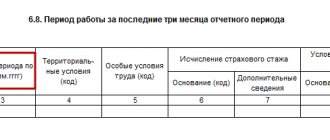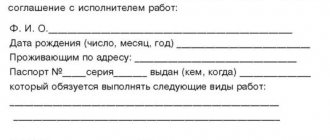Work (not) stipulated by an employment contract
N. Minkina
WORK (NOT) CONDITIONED BY AN EMPLOYMENT CONTRACT
In its most general form, work represents a certain amount of human effort and time spent on work.
Based on international standards and natural constitutional human rights, Article 2 of the Labor Code of the Russian Federation (hereinafter referred to as the Labor Code of the Russian Federation) provides for the principle of freedom of labor, including the right to work, which everyone freely chooses or freely agrees to, as well as the right to dispose of their ability to work , choose a profession and type of activity. This is primarily expressed in the conclusion of an employment contract, under which the employee personally undertakes to perform work for a certain labor function (Article 56 of the Labor Code of the Russian Federation).
The labor function (work according to the position in accordance with the staffing table, profession, specialty indicating qualifications, as well as the specific type of work entrusted to the employee) in accordance with the provisions of Article 57 of the Labor Code of the Russian Federation is one of the mandatory conditions of the employment contract, which can only be changed by agreement parties in writing.
In this regard, the practice according to which some employment contracts do not disclose the content of the employee’s labor function seems questionable. In this case, there is a reference to the job description, which becomes an integral part of the employment contract. However, it is clear that in practice, a copy of the employee’s concluded employment contract does not include such a part. The job description, if available, is kept by the employer, which opens up scope for his abuse. Moreover, for known reasons, workers in this case are not always familiarized with the job description.
It should be recognized that it is not without the “tacit consent” of the employee himself that he finds himself in an unfavorable situation for himself. Meanwhile, the legislator in Article 60 of the Labor Code of the Russian Federation provides for a prohibition for employers to require employees to perform work not stipulated by the employment contract, except in cases regulated by the Labor Code of the Russian Federation and federal laws. Therefore, the employee is obliged to perform only such work that relates to his labor function, and the employer does not have the right to unilaterally demand that the employee perform work that is not provided for by the terms of the concluded employment contract.
Accordingly, it is possible that the terms of the employment contract may be changed, including the labor function, by written agreement of the parties. It seems that the reference in Article 60 of the Labor Code of the Russian Federation to “work not stipulated by an employment contract” implies not only work that does not correspond to the employee’s labor function provided for in the contract (that is, the substantive part of the work), but also work that is outside the established working hours contract (that is, the time boundaries of work, its beginning and end).
The provisions of Articles 60, 97, 99 and 101 of the Labor Code of the Russian Federation provide for exceptions to the general rule prohibiting requiring an employee to perform work not stipulated by the employment contract.
Thus, the employer has the right to engage an employee without his written consent to work beyond the working hours established for this employee by any regulatory legal acts of the Russian Federation containing labor law norms, a collective agreement, agreements, local regulations, an employment contract, etc. cases:
- attraction to overtime work (Article 99 of the Labor Code of the Russian Federation);
- if the employee is provided with an irregular working day (Article 101 of the Labor Code of the Russian Federation).
Article 99 of the Labor Code of the Russian Federation lists three cases - the grounds according to which employers are allowed to involve workers in overtime work without their consent. In a general sense, these cases are associated with emergency situations and force majeure. Despite the fact that the legislator has not clearly defined the procedure for involving employees in overtime work, it seems that involvement in such work, including when the consent of employees is not required, should be formalized in writing by the employer issuing an appropriate order (instruction). Since the specifics of the grounds often do not allow the employer to issue this order or instruction in advance, in order to ensure an accurate accounting of the duration of overtime work for each employee, the employer needs to do this as the opportunity arises.
In addition, pregnant women, minor workers and other categories of workers specified in federal laws are not allowed to work overtime, even if they express their consent. In other cases, overtime work requires the written consent of the employee. An employee’s refusal to work overtime should not be regarded as a violation of labor discipline.
Noteworthy is the fact that in practice there is no uniform approach in understanding and applying the following related institutions of labor law: “overtime”, “irregular working hours”, “part-time work” and “combining professions (positions)”. So, for example, work performed in excess of the established duration of working hours in the order of internal part-time work (Articles 60.1 and 282 of the Labor Code of the Russian Federation), as well as overtime in excess of the established duration of working hours during irregular working hours (Articles 101 and 119 of the Labor Code of the Russian Federation) are not considered overtime. . In addition, overtime work performed by an employee outside of working hours for the benefit of his employer, who has also become a customer under a civil law contract, in particular contract agreements and (or) paid services, is not recognized as overtime.
At the same time, it is unacceptable to replace overtime work with internal part-time work or civil contracts in order to conceal cases of exceeding legal limits on limiting overtime work or to avoid paying for it.
Thus, overtime work is work, although not stipulated by an employment contract, but as an exception permitted by the labor legislation of the Russian Federation, in which the employer can involve the employee without his consent.
If overtime work is actually organized on the initiative of the employer, then part-time work refers to work on the initiative and desire of the employee himself. Part-time work is the performance by an employee of other regular paid work under the terms of an employment contract in his free time from his main job. Concluding employment contracts for part-time work is allowed with an unlimited number of employers (Article 282 of the Labor Code of the Russian Federation).
Obviously, a part-time job is a job stipulated by an employment contract, but a second employment contract of the employee with the same employer (internal part-time job) or with another employer (external part-time job).
The practice of registering internal part-time work is controversial, when an employee works under two or more employment contracts in one organization, with one employer.
Initially, it should be noted that the legislator does not establish differences in the design of internal and external part-time work. In this regard, the following approach seems to be the most correct.
Any part-time job is formalized with the employee by concluding a separate employment contract indicating all the mandatory conditions, followed by the issuance of an order (instruction) on hiring a part-time worker. In this case, the content of the employer’s order must comply with the terms of the concluded employment contract. The order to hire a part-time worker, as well as other employees, is announced against signature within three days from the date of actual start of work.
Information about part-time work in the work book is entered at the request of the employee at the place of his main job (clause 20 of the Rules for maintaining and storing work books, producing forms of work books and providing them to employers, approved by Decree of the Government of the Russian Federation No. 225 of April 16, 2003).
At the same time, internal part-time work must be distinguished from combination of professions (positions). As practice shows, the employer, in a situation of choice, prefers to register a combination of professions (positions) rather than an internal part-time job. By the latter, the legislator understands additional work in a different or the same profession (position), assigned by the employer with the written consent of the employee and performed by the employee during the established working hours along with the work specified in the employment contract.
The characteristic features of internal part-time work are:
- its implementation outside the normal working hours, that is, the time of work under the main employment contract;
- its execution by concluding a separate employment contract;
- his payment within the framework of the wages due to the employee under the concluded part-time employment contract.
Meanwhile, combining professions (positions) is carried out for additional payment, paid to the existing salary under the main employment contract, the amount of which is determined by agreement of the parties (Article 151 of the Labor Code of the Russian Federation).
In addition, the employee combines professions (positions) within the established duration of the working day (shift) along with the work specified in the employment contract. This combination can be carried out in the form of additional work in the same profession or in another profession (position). In the first case, this is possible by expanding service areas and increasing the volume of work. To perform the duties of a temporarily absent employee without release from work specified in the employment contract, the employee may be assigned work in either another or the same profession (position). An ambiguous interpretation is caused by the legislator’s wording that combining professions (positions) is possible “with the written consent of the employee.” Since there is no direct indication of the conclusion of an employment contract, employers often formalize the combination of professions (positions) by order or directive, which is announced to the employee against signature. The latter is regarded by the employer as the “written consent of the employee” required by law. This may also be preceded by a verbal agreement between the employer and the employee.
However, it seems most correct to formalize the combination of professions (positions) with an additional agreement to the previously concluded employment contract. This becomes especially relevant if we are talking about additional work in another profession (position). In this case, the issue of the employee’s labor function in a combined profession (position) needs detailed regulation, since this goes beyond the scope of the concluded employment contract. Moreover, the content of this agreement can be indicated by additional conditions on combining professions (positions), for example, the deadline for completing additional work, its content, volume, etc., as agreed upon by the parties to the employment contract.
There is no doubt that in order to develop the most uniform practice for registering combinations of professions (positions), the provisions of Article 60.2 of the Labor Code of the Russian Federation require appropriate legislative changes with the consolidation of rules of an unambiguous nature. Based on the above, combining professions (positions) can be considered as additional work stipulated by the employment contract, to which the employee has the consent. Along with these cases, the employer has the right to engage an employee to work outside the established duration of his working hours, if this employee performs labor duties on an irregular working day.
An irregular working day is a special work regime, according to which certain categories of workers may, by order of the employer, if necessary, be occasionally involved in the performance of their labor functions outside the working hours established for them (Article 101 of the Labor Code of the Russian Federation).
Irregular work cannot be considered as stable work outside the normal working hours, since Article 101 of the Labor Code of the Russian Federation deals only with occasional, and not systematic involvement of an employee in this work.
Otherwise, it can be argued that there is overtime work that is subject to additional payment in contrast to irregular work. Work on irregular working hours is subject to other compensation. According to Article 119 of the Labor Code of the Russian Federation, in such cases additional paid leave is provided, the duration of which should be determined by local regulations (for example, internal labor regulations), a collective agreement, or an employment contract. However, the minimum duration of additional leave for employees with irregular working hours cannot be less than three working days.
This, even the minimum duration of additional paid leave, seems very insufficient, given the conditions encountered in practice, the nature and frequency of irregular work. This is especially important since, when approving internal labor regulations, employers, as a rule, limit themselves to duplicating the norms of the Labor Code of the Russian Federation, focusing on the minimum duration of additional days of rest for workers with irregular working hours.
In the conditions of non-provision of additional paid leave to these employees, one can again argue about the need to compensate for additional work as overtime.
You should also pay attention to the fact that the list of workers with irregular working hours should be provided for in a collective agreement, agreement or local regulations adopted taking into account the opinion of the representative body of workers. Traditionally, this category of workers includes:
- responsible persons from among the management team;
- persons whose work during the working day cannot be accurately recorded and controlled (for example, a legal adviser);
- persons who distribute working time at their own discretion (foresters, rangers, home workers, etc.).
Unfortunately, in practice there is an approach with an unreasonably broad interpretation of persons for whom irregular working hours can be established. Meanwhile, each of the listed categories of workers with irregular working hours has its own labor characteristics, which leads the law enforcement sphere to a different understanding and application of irregular work.
In the legal literature there is no consensus on this issue. Some Trudoviks by irregular work mean performing a labor function outside the established working hours, which only includes overtime in excess of the established daily working hours and, accordingly, in excess of the standard working hours for the accounting period when recording working hours in total. Others, in understanding irregular working hours, along with the above, include work on weekends and annual non-working holidays.
Due to the obvious benefits for the employer, the latter approach is becoming increasingly widespread. Moreover, in the texts of employment contracts one can find only a brief indication of the peculiarity of the working time regime - “irregular working hours”, without assessing and disclosing its constituent provisions. And only in the course of fulfilling their labor duties under such an agreement, employees, as a rule, begin to realize with regret that they can be involved in work beyond the established working hours without their consent and that the need for this is determined at the discretion of the employer.
Ultimately, the lack of specification of the rules on the use of irregular working hours leads to an unlimited understanding of “work stipulated by an employment contract.” Thus, on the issues discussed in this article, the identified legislative inaccuracies need to be improved.
What are the risks of working without official employment?
As already mentioned, “an unofficial worker is deprived of all rights and guarantees. However, even in this case, he can and must defend his rights, since the legislator has provided certain protection mechanisms.
For example, in accordance with Art. 67 of the Labor Code of the Russian Federation, the employer is obliged to conclude an employment contract with the employee no later than 3 days from the moment he was actually allowed to work. The day of concluding the agreement is considered the first day of work (provided that the citizen has begun his duties by order or instruction of the employer) - it is from this moment that the employee has the right to demand the conclusion of an employment contract with him. In case of refusal, the employer can be forced to conclude a contract by going to court.
At the same time, remember that in court you will have to prove that you really work for this company. As evidence, you can use video and audio recordings, any documents (both paper and electronic), testimony of witnesses, etc.
You will have to prove not only the fact of work itself, but also the conditions under which you agreed to work, for example, the amount of wages and the period of work. Pay slips, expense orders or other similar documents will help you with this.
Official employment registration according to the Labor Code of the Russian Federation
By official we mean employment according to the Labor Code of the Russian Federation, according to which the employee is given the right to receive the salary established by the employment contract, paid vacations and sick leave; in addition, the employer assumes the responsibility to pay insurance premiums, taxes, etc. for the employee. In other words, official employment guarantees the employee receiving all the rights and guarantees enshrined in law.
Official employment is carried out on the basis of a personal written application from the employee, by issuing an appropriate order by the employer and concluding an employment contract (TA). The last document is drawn up and signed in 2 copies (one for each party). Employment information is always entered into workers’ work books.
After concluding a TD, the employer must pay taxes and bear other additional obligations to the employee. To avoid unnecessary hassle and save on taxes and other payments, some employers are in no hurry to officially employ citizens and offer unofficial employment or limit the formality of it. So, for example, they can offer a job:
- on the terms of an oral agreement (without execution of any documents);
- on reduced working hours (despite the fact that the employee actually works full time);
- on conditions of the lowest possible wage (the so-called black-and-white salary).
The order of acceptance to work
The document is issued within three days from the date of commencement of work. The basis for its preparation is a person’s application with a request to be hired. trong>The order displays full information about the nature of the labor relationship. It indicates the date from which the person got a job, his profession or position, working hours and salary. The order confirms the fact that the person is employed. Its text part must be drawn up in accordance with the Labor Code of the Russian Federation and synchronized with the provisions of the employment contract. The presence of contradictions is a legal violation.
The employee must familiarize himself with the order, which is certified by the employer and the company’s seal, if this is provided for by the internal regulations on office work. A copy of the document is provided to the employee, who must put his signature on the original, indicating the transfer of the paper.








